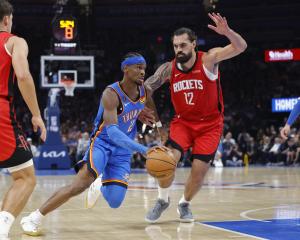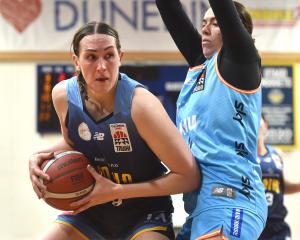It has been a big two decades for basketball in New Zealand since the Tall Blacks’ 2002 heroics. But where to from here? Jeff Cheshire asks that question as our series concludes.

More people are playing the game and following the game.
Professionalism has increased tenfold and the coaching and development available for the country’s youth continues to improve.
So, where to from here?
How does the sport not only sustain the success, but build on it?
It was a question at the forefront of Basketball New Zealand chief executive Dillon Boucher’s mind, 20 years on from being part of that Tall Blacks team that set the country on this path.
"That’s the challenge, right?" Boucher said.
"The challenge is now to keep going on the forward trajectory and the upward trajectory.
"We need to have the numbers continuing to grow at the community level. We need to have clear pathways that our young generation can go through those pathways to become Tall Blacks and Tall Ferns.
"We need to make sure we’ve got something available for our sport. We’re still making our sport fun for these kids to be a part of.
"If they’re still enjoying playing, then naturally, they’ll be able to continue on that journey that I was fortunate enough to go on as a player."
The growth has presented some problems, problems that did not exist 20 years ago.
Having more players and teams across the country is one thing.
Having the court space, coaches and referees to cater for that increased playing demand is another.
"I think the stadiums are the big ones for us now," Boucher said.
"We’re busting at the seams in every region. We’re seeing new facilities built and they’re busting at the seams a year later.
"We’ll continue to work with governments and councils to be able to keep up to speed with what we need as far as stadiums go, to be able to keep up with the growth of the sport.
"We’re putting more and more outdoor hoops in for that reason. So if anyone wants to play basketball there’s a hoop at their local park, or just down the road from their house, or in their school.
"[We need to] just make sure we keep putting those hoops out there, keep having the sport accessible to anyone who wants to play it."
One goal was getting the Tall Blacks and Tall Ferns more home games. While the New Zealand Breakers and NBA have captured the public’s imagination, the national teams have been yet to do so in the same way.
Putting the national teams in front of New Zealanders would help with that, he believed.
Whether Steven Adams, who now plays for the Memphis Grizzlies in the NBA, will pull on the Tall Blacks jersey remains up in the air. Boucher said BBNZ would love him to play, although it felt Adams had contributed hugely to New Zealand basketball without having represented the national team.
He had helped raise the awareness of New Zealand basketball globally and Boucher believed more Kiwi kids were getting American college opportunities because of it.
That college pathway — there are now more than 120 New Zealanders playing in that American system — was now more viable than it was 20, or even 10, years ago.
It was an important pathway in the development of New Zealand’s top talent, as was the traditional one through the national league at home.
However, while all of that was significant, it was not the only focus. Much of the growth in playing numbers has come in the social space, which Boucher said was equally important to cater for.
"I think all levels and all factors are important.
"We talk a lot about fan engagement. A fan is anyone who can consume basketball — whether it be a parent, or a kid watching NBL or Tauihi, a person playing with their mates in the backyard, or a person who buys merchandise.
"They’re all fans and they’re all important for the ecosystem of basketball.
"We need some that choose to take it seriously. But we also need those social players. Those fans of the game and fans of watching, fans or playing, those who just want to get around with their mates and have a bit of fun on the outdoor courts."
Ultimately, though, he felt the sport was in a good place.
It was one which he felt fitted with the changing nature of New Zealand society.
Continuing to be present among that society would help facilitate the growth.
"I think I really believe basketball is on the rise, and is continuing to be on the rise," Boucher said.
"We’re a sport that is suitable to the new New Zealander. I richly believe that New Zealand is changing and our sport is quick to be able to meet those challenges for the new New Zealander.
"And I also think for a sport we’re big in the community. We’re big about giving back.
"You’ll even see even our national league teams and our Tauihi Aotearoa teams, they’re always giving back to the community ."











